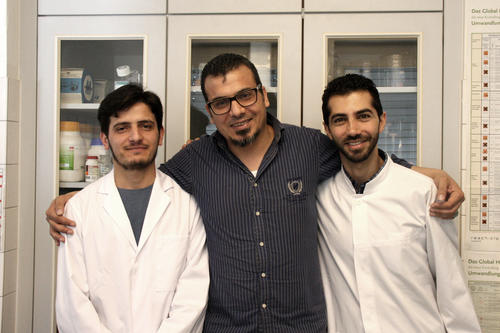“They are a wonderful asset for our institute.”
Two young veterinarians fled the war in Syria and found work as doctoral researchers at the Institute of Veterinary Anatomy.
Jun 15, 2016
A great team: Salah Al Masri (center) with his graduate students, the Syrian refugees Zaher Al. (left) and George H. (right).
Image Credit: Annika Middeldorf
"There are still some cities in Syria that are supposedly safe, and the city of Hama is one of them," said Salah Al Masri, a researcher at the Institute of Veterinary Anatomy. He continues, “But the war is already raging just outside the city.” Eight years ago Al Masri, who has a doctorate in veterinary science, left Syria. This was before war and terror held the country in their grip. Al Masri maintained contact to the city of Hama, where he had studied at the university — and gave two young men from there new prospects. In January, the Syrian refugees Zaher Al. and George H. joined Al Masri’s research team. The two graduate students are now working on their doctorates at the Institute of Veterinary Anatomy in Freie Universität's Department of Veterinary Medicine.
The two refugees do not wish to have their last names published in this article. Since they completed their university degrees in Syria, the regime could draft them into military service at any time, according to Al Masri, who is acting as an interpreter in the interview with the two young men. “Military service for them would mean, kill or be killed,” says Al Masri and asks, “Who wouldn’t flee their homeland under those conditions?”
German Classes after Work
The Syrians are a little shy and take time to answer questions about their previous lives and their new beginnings in Germany. Considering how recently they came to Germany, their German is very good. They attend German classes every day after work, and they insist on conducting the interview in German.
Zaher Al., who is 30, tells how in February 2015 he boarded an airplane that flew from Syria to Algeria. That flight was the only part of his four-week journey that was legal. He made his way from Algeria to Morocco, where he boarded a smuggler's boat headed for Spain. After arriving in Germany, Zaher Al. found refuge in a shelter in North Rhine-Westphalia.
George H., who is 32, reached Germany via the so-called Balkan route. He then landed in a collective center in Baden-Württemberg. Both young men were able to move to Berlin because of their jobs as doctoral researchers. They worked very hard to achieve this status. In addition to being very industrious, they had psychological motivations: since their respective families still live in Syria, they try to distract their fears and worries through work.
"It is important to work toward a goal"
George H. was not able to just sit still and wait, even during his first stop in Germany in Weinheim, Baden-Württemberg. "I looked for an internship and found one in a small animal hospital, where I started to work as an intern right away," he says. Zaher, who worked as an intern in an equine hospital, also did so for the sake of distraction. "It is very important to have something to do and to work toward a goal," he says.
The two Syrian veterinarians hope to have completed their doctorates within three years. They are working in a joint project to save male chicks from being killed in the commercial egg-producing industry. This deplorable state of affairs has been in place for a long time: about 50 million male chicks are killed annually just after hatching. They are considered useless as they cannot produce eggs, and they do not grow large or fast enough to be raised profitably for meat.
Research to Stop the Killing of Male Chicks
"The issue is politically sensitive," says Al Masri and continues, "The individual German states are negotiating on whether or how the killing of male chicks can be prevented." Recently the Supreme Administrative Court in Munster ruled that killing male chicks directly after hatching does not violate the Animal Welfare Act. This is incomprehensible for Al Masri and his graduate students, who are conducting research on a dual-purpose breed – a breed in which the hens would lay a sufficient number of eggs, and the males would gain weight faster. Then there would be no more reasons for killing the male chicks.
Zaher admits that he is not overly interested in chickens. His favorite animals walk on four legs. "Later I would like to work in an equine hospital. That would be my dream," he says. But first both of the doctoral students want to do research. Salah Al Masri is very happy about that. In addition to his work at the Institute of Veterinary Anatomy, he is the Executive Chairperson of the nonprofit Union of Syrian Students and Researchers that supports Syrian students in getting integrated in university life.
"I knew that there are many veterinarians in Syria," says Al Masri. When new graduate students were being hired at his institute, he published the job vacancy in Arabic and English. Zaher Al. and George H. were qualified – and were hired. Al Masri has no regrets about the decision: “They are a wonderful asset for our institute.”

